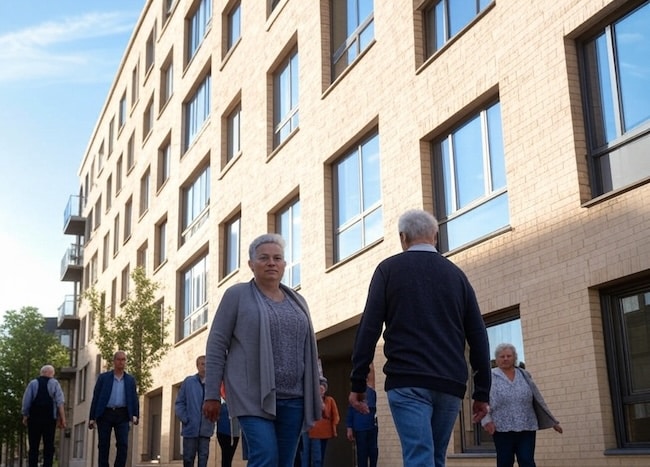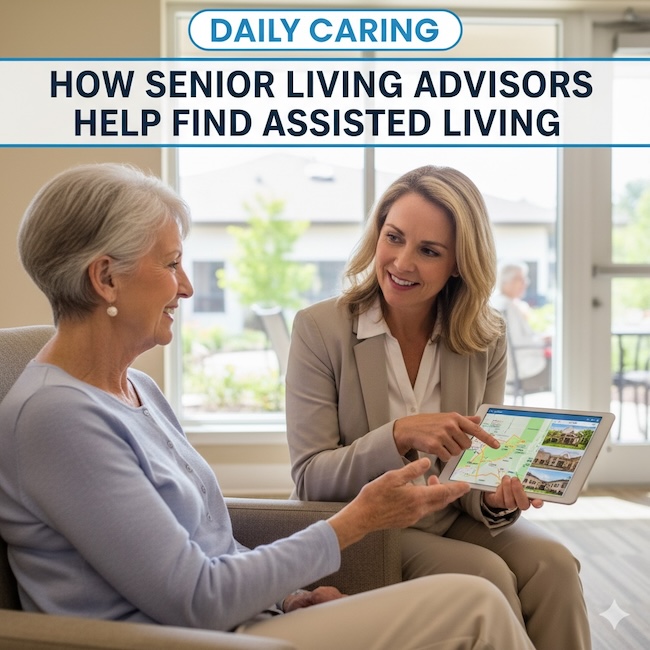Finding safe, affordable housing can be one of the biggest financial challenges for seniors living on fixed incomes, but you may qualify for help without realizing it. From government-subsidized apartments to nonprofit initiatives, specialized programs are designed to keep housing costs manageable while maintaining independence.
This article breaks down three little-known but vital housing programs for older adults, including eligibility tips and application strategies. Whether you're struggling with rising rent or need accessible home modifications, these resources could be the key to securing a comfortable, budget-friendly home for years.

Affordable housing programs can help low-income seniors find a safe, stable place to live without spending most of their income on rent. While the application process can be slow and competitive, programs such as Section 8, Section 202, and LIHTC offer genuine options for qualifying seniors.
Affordable Housing for Seniors
Senior housing can be costly, so seniors often have to spend a significant portion of their retirement savings on rent.
Luckily, there are affordable housing programs that can help you find the best quality of care for yourself or a loved one without breaking the bank.
Here are three Housing and Urban Development (HUD) programs with a silver lining.
VIDEO: 3 Affordable Housing Programs for Seniors
Option 1: Low-income Housing Tax Credit (LIHTC)
While not specifically targeted toward senior living, this federally funded program aims to ensure there is enough low-income housing to meet the needs of the population.
According to HUD, which created the LIHTC, an average of 105,000 units were made available annually from 1995 to 2011.
The building owner chooses how many units will be set aside for low-income residents. Owners accept the rent amount specified by HUD to participate in the program and be eligible for tax credits.
A senior who meets the HUD income criteria can research their local area for HUD-approved dwellings that offer the Housing Tax Credit. Be aware that many properties have a waiting list, and the availability of open waitlists may be limited depending on demand in your area. These listings are a good starting point if you're looking for an affordable apartment with basic amenities, such as a bathroom and laundry access.

Option 2: Housing Choice Voucher Program
Commonly known as Section 8, this affordable housing option enables low-income residents to rent “safe and reasonable” apartments or other accommodations.
Under Section 8, landlords accept 30 percent of the family or individual’s income as a full rent payment.
To be eligible, your income must not exceed 50 percent of the median income in the local area. Section 8 is not a senior-specific low-income program. Many local housing authorities maintain a waiting list, and it’s essential to check for open waitlists periodically. This can help you find an affordable place that suits your needs.

Option 3: Section 202 Supportive Housing Program
Also HUD-funded, the Section 202 Supportive Housing Program is specifically geared toward adults aged 62 and older who meet the “very low income” requirement.
It’s the only government-subsidized affordable housing program offered exclusively for seniors. Section 202, similar in structure to Section 8, currently funds over 250,000 senior living units.
Participants pay 30 percent of their income for rent, with the HUD subsidy covering the remaining balance. Many Section 202 communities have waiting lists, so applying early and checking for open waitlists is recommended. These communities often feature senior-friendly amenities, including private bathrooms and on-site laundry facilities.
Challenges for Seniors Applying for Affordable Housing Programs
When applying for affordable housing programs, seniors may face several steps and challenges, including:
Long Waiting Lists
Most programs, especially Section 8 and Section 202, have lengthy waiting lists. In some areas, lists are closed for months or even years. Seniors may have to monitor local housing authority websites for open waitlists and apply quickly when they become available.
Complex Application Process
Applications often require documentation, such as proof of income, identification, Social Security benefits, and medical expense records. This can be a barrier for seniors with limited mobility, memory issues, or no help from family.
Digital Skills Required in Many Cases
Many applications are now available online. Seniors without internet access or digital skills may struggle to apply or check their status.
Limited Room Inventories and Availability
Even if a senior qualifies, finding a senior-friendly apartment, such as one with an accessible bathroom, grab bars, no stairs, or nearby laundry facilities, can be challenging, especially in high-demand cities.
Seniors Face Income and Eligibility Checks
Seniors must meet income eligibility requirements, which vary by location. They may also face eligibility reviews or background checks, including reviews of their rental and credit history.
Lack of Expertise and/or Support
Seniors without a case manager, social worker, or family advocate may struggle to navigate the process or keep up with paperwork.
Affordable Housing Application Tips
Here are some practical tips to help seniors navigate the affordable housing application process:
✅ Get Organized Early
Gather key documents: ID, Social Security card, proof of income (Social Security, pensions), bank statements, and medical expense records.
Make copies and keep them in one place for easy access.
✅ Sign Up for Alerts
Check local housing authority websites and sign up for email or text alerts about open waitlists.
Some nonprofits also offer notification services to inform applicants when applications open.
✅ Get Help from Local Resources
Reach out to local Area Agencies on Aging, senior centers, or nonprofit housing organizations. They often have staff who can assist with paperwork or online forms.
✅ Apply to Multiple Programs
Don’t rely on just one option. Apply to Section 8, Section 202, and any local or state-run affordable apartment programs.
Keep track of where and when you applied.
✅ Follow Up
After applying, follow up to confirm that your application was received and complete.
Ask how to update your file if your income or contact info changes.
✅ Be Prepared to Wait
Many programs have a waiting list. Check your status periodically and update your application as needed to stay active.
✅ Request Reasonable Accommodations
If you have a disability or health issue, you can request assistance with filling out forms or request accommodations during the process (e.g., a ground-floor unit or a unit with a walk-in bathroom).
Frequently Asked Questions:
Is low-income housing based on credit?
Low-income housing programs, such as those administered by HUD (including Section 8 or Section 202), are primarily based on income, rather than credit. However, individual property owners or housing authorities may check credit history as part of their screening process. A poor credit score doesn't automatically disqualify someone, especially for subsidized housing; however, factors such as recent evictions, unpaid rent, or utility bills in collections may be taken into consideration.
What's the difference between Section 8 and affordable housing?
Section 8 is a specific federal program that provides housing vouchers to help low-income individuals and families pay rent in the private market. Tenants typically pay 30% of their income toward rent, and the government covers the rest.
Affordable housing is a broader term that includes various types of housing—public, nonprofit, or privately owned—offered at below-market rates to people with low or moderate incomes. This includes programs like LIHTC, Section 202, and others. Section 8 is one type of affordable housing, but not all affordable housing is Section 8.
Guest contributor: Seniorly.com is a free service for families seeking elder care communities for their loved ones in the San Francisco Bay Area, Sacramento, Los Angeles, and beyond. Seniorly’s mission is to connect families and local housing providers by delivering services that keep seniors engaged and happy. Their Resource Center is stocked with articles on topics related to aging, and the Seniorly Living Blog features guest writing from industry experts, including DailyCaring! We all need community. Seniorly can help you find yours!














I am 67 year old i would like a nice 2bedroom in nice area I work 4 days a week. Memphis don’t have a nice place for people like me who still got to work a afford place it sad. They have nice apartment but how do you apply and where they at. If their is a nice two beds room home or a apartment please let me know I just want enjoy my last days in a nice apartment. Thank so much for listening to me my phone number is [removed for privacy] my email is [removed for privacy] God bless thank you so much. June Crutcher
To get help finding housing, you may want to contact your local Area Agency on Aging to see what type of help or referrals they can provide. More info here – Area Agency on Aging: Resources for Seniors https://dailycaring.com/area-agency-on-aging-resources-for-seniors/
You might also want to contact a local senior housing specialist or geriatric care manager (also called an aging life care expert). We’ve got tips and more info in these articles:
– How a Senior Living Advisor Helps Find Housing https://dailycaring.com/senior-housing-experts-help-seniors-find-the-perfect-place-to-live/
– A Geriatric Care Manager Helps Seniors and Families Navigate the System https://dailycaring.com/how-geriatric-care-manager-can-help-you/
Looking for home for mom with dementia and is low income and on sec 8
You might want to contact your local Area Agency on Aging to find out if they can refer you to an organization that can help you locate suitable housing for your mom.
More info here – Area Agency on Aging: Resources for Seniors https://dailycaring.com/area-agency-on-aging-resources-for-seniors/
I need a one bedroom small housing because of my low income. My daughter is selling her house soon and I’m not going to have a place to go.
Here are some suggestions on senior housing options and for getting help finding a new place to live:
– 7 Senior Housing Options: Which One Works Best? https://dailycaring.com/senior-housing-options-overview/
– How a Senior Living Advisor Helps Find Housing https://dailycaring.com/senior-housing-experts-help-seniors-find-the-perfect-place-to-live/
Hello name kenyatta Brown looking for senior citizens places for my mom 71 years old, independent on her own.
We’ve got some suggestions on senior housing options and for getting help finding a place for an older adult here:
– 7 Senior Housing Options: Which One Works Best? https://dailycaring.com/senior-housing-options-overview/
– How a Senior Living Advisor Helps Find Housing https://dailycaring.com/senior-housing-experts-help-seniors-find-the-perfect-place-to-live/